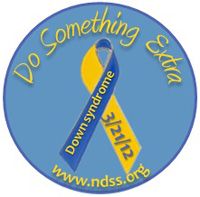Today's blog is devoted to two of Joey's friends-- Casey and Conner. Identical twin boys who are about 8 months older than Joey and who provide us with inspiration on a daily basis. Identical twins with Down syndrome occur at the rate of about 1 or 2 in a million. They are truly two in a million.
I met their parents, Meghan and Matt through the Cleveland Up Side of Downs Buddy Walk committee. Their grace, kindness, happiness and willingness to help out in any way possible is what I loved immediately about them both. Then there is Casey and Conner-- I spent the entire first committee meeting completely flirting with these two handsome boys. Meghan writes beautifully about their lives at their blog: The 3rd 21st.
To meet Meghan is to love her. She is incredibly positive and she puts about 210% into her sons. I have never heard her once complain about the hard work it takes to have twins or any of the challenges she has faced. Her spirit and personality are infectious. Plus, let's just face it-- all mothers of twins are incredible!
The below article was in this past weekend's Akron Beacon Journal on Sunday and we were thrilled to see such a beautiful article that accurately describes what it is like to have a child who has Down syndrome. What a way to celebrate National Down Syndrome Awareness Month! You may also recognize these boys from the Summit DD Early Intervention billboard.

I hope you enjoy learning more about Casey and Conner and all of their accomplishments. We are so proud to know them and call them friends.
Tomorrow's blog will be participating in the joint "31 for 21" efforts and the subject is "I'm Glad I Have a Child With Down Syndrome Because. . ."-- I can't wait!
Parents of children with Down syndrome speak out
By Kim Hone-McMahan
Beacon Journal staff writer
Published: October 9, 2011 - 07:42 AMBeacon Journal staff writer

Nineteen-month-old brothers Casey (left) and Connor Wilkinson sit in their chairs on the front porch of their home. The twins were born with Down Syndrome. (Karen Schiely/Akron Beacon Journal)
RELATED STORIES
It was in the recovery room at Akron City Hospital that Meghan and Matt Wilkinson learned the news. Doctors suspected their newborn identical twins had Down syndrome.
Meghan needed some time alone. After several attempts, she finally persuaded her family to go get a bite to eat. That’s when she broke down. She prayed that the diagnosis was wrong. But she quickly discovered that it really didn’t matter; she had already fallen deeply in love with her boys. Besides, she reasoned, Down syndrome (DS) was just a small part of what defined them — her “miracle men.”
October is Down Syndrome Awareness Month, a perfect time to introduce you to the Wilkinsons and other inspiring children with DS and their parents.
In the Wilkinsons’ case, the boys, Casey and Connor, are two in a million — literally. According to Down Syndrome Education International, identical twins with Down syndrome occur at the rate of 1 or 2 in a million pregnancies.
Shortly after the babies were born on Dec. 4, 2009, Meghan created a blog (http://caseynconnor12409.blogspot.com/). The first entry began with a message to her children.
“I worry that I will be a good mother … but I know for a fact there is not another person on earth that loves you more or the same way that I do,” Meghan wrote. “I am honored to be your mother. Everyday I thank God for you both. I think back to that first day of your lives and how I worried secretly that I had done something wrong to cause your DS. I worried your dad would think I gave him ‘broken babies,’ even though he denied that he thought that. I was certain that I caused this.
“I realize now that you two may not be the sons I had planned on but you are the sons God meant for me to have. You are my one in a million babies.”
Making choices
Dr. Harriet Feick, a neonatologist at Akron Children’s Hospital, broke the news to the Wilkinsons. Meghan said the thing she remembers most is that the doctor didn’t apologize.
“She didn’t say, ‘I’m sorry,’ because there is nothing sorry about this sweet face,” she said, nudging one of the boys, who was sitting between her and Matt in their Cuyahoga Falls home.
Being upfront from the start with parents is important, Feick said.
“Sometimes they hate you forever because, for some families, it’s not what they want to hear. And it is so upsetting … that they have to be mad at someone and it’s often the person who first delivers the news,” the doctor said.
But in time, Feick said, she is usually able to win them over. And it’s fascinating, she said, to watch a family go from devastation when the baby is born to undying love by the time they leave the hospital.
A diagnosis of Down syndrome does not have the same connotations it did decades ago, when those with the condition were sometimes institutionalized. There have been vast improvements in education, job opportunities and acceptance, though there is still a lot of room for improvement.
For at least part of their school day, children with special needs are generally placed in classrooms with students without disabilities.
On the work front, more jobs are needed, but organizations such as the Summit Developmental Disabilities Board help find jobs and provide training and support. Hattie Larlham, a nonprofit group, provides employment in popular industries, such as food service, pet care and agriculture. That program is designed to help those with disabilities become self-sufficient and economically stable.
While there may be day-to-day challenges raising a child with DS, the problems are often countered with an outpouring of love.
“If the hardest part of our day is how many hugs and kisses we are going to get, or how many times the boys are going to smile, then our lives are going to be awesome,” Meghan said.
Change coming
In the last international study conducted in 1999, using data from the United States, United Kingdom, New Zealand, France and Singapore, researchers concluded that about 92 percent of women worldwide who receive a definitive prenatal diagnosis of Down syndrome through amniocentesis or chorionic villus sampling will terminate their pregnancies.
Then, and now, only about 2 percent of pregnant women opt to have these invasive tests. But Dr. Brian Skotko, who is part of the Down Syndrome Program at Children’s Hospital Boston and a member of the National Down Syndrome Society Board of Directors, said that perhaps as early as the end of this year, a new blood test is expected to be available for all pregnant women that can determine whether a fetus has Trisomy 21, the most common form of Down syndrome.
“The anticipation is that almost 100 percent of women will choose to get this noninvasive blood test — if it is accurate and it is reimbursed. Therefore, we will see Down syndrome shift from a post-natal diagnosis to almost exclusively a prenatal diagnosis,” Skotko said.
So will Down syndrome slowly start to disappear?
“Everyone who gets that diagnosis will now need to grapple with the very personal question. … How do I proceed with this pregnancy?” Skotko said.
Andi and Johnathon Fister knew before Emma’s birth on July 15 that she had DS. But they wanted nothing to do with abortion, though they were asked repeatedly by their first doctor whether they wanted to continue with the pregnancy.
“It was our baby. It wasn’t even a thought for us,” said Johnathon, sitting beside his wife in their Akron home, a pink-cheeked Emma in her mother’s arms. “Everyone deserves a life.”
Telling parents
Generally, Dr. Feick said, the first thing parents want to know when testing is positive for DS is whether the child is going to be intellectually disabled. In response, the doctor explains it’s impossible to predict whether a child with DS who is still in the mother’s womb will be high functioning. And she gently reminds them that it’s impossible to tell that about any fetus.
One complication that can often be predicted prenatally is serious cardiac disease, common in children with DS. “That may often be the piece that makes them say, ‘Well, I don’t want to put a baby through lots of surgeries. And they may not make it any-way,’ ” Feick said.
Those with Down syndrome are also at risk for other health problems, including leukemia, respiratory complications, early-onset Alzheimer’s disease and hypothyroidism.
But not all of those with DS have these health problems — such is the case, thus far, with the families interviewed here.
“Some fall into normal intelligence,” said Feick, noting that they have remarkably high social IQs.
“That’s why people always say they are friendly. Though their total IQ may be low, they often seem smarter because they are so social. And that’s big,” Feick said. “Because if you are pleasant, people like to have you around.”
Milestones
One such fellow who oozes with personality is Adam Kuenzli.
When he was born on July 4, 1983, his mother, Carol, suspected immediately that he had Down syndrome. When the baby was placed on her chest, Carol noticed that his eyes were typical of someone with the condition.
Those suspicions grew when nurses refused to bring the baby to her room. Early the next morning, a pediatrician confirmed her intuition.
“The doctor told us that the baby had Down syndrome … but that we would all work it out together,” Carol remembered. “He told us to bring in the whole family. He said everybody needs to hold him, hug him and bond with him and that he is going to learn everything, but at his own pace.
“He said we would all experience Adam’s successes because we would all be working with him. ‘Every milestone he makes you get to celebrate,’ he added.”
When Adam graduated from Stow-Munroe Falls High School in 2001, he received the prestigious Principals Award.
Then-unit principal Bill Humble told the audience that Adam constantly displayed the six pillars of trustworthiness, respect, responsibility, fairness, caring and good citizenship.
“I have seen him perform countless acts of kindness for others — both for his peers and the adults around school,” Humble said.
With tears in her eyes, Carol joined the rest of the audience standing in honor of her son.
Today, Adam is a bagger at his neighborhood Acme Fresh Market and, among other things, a swimmer with the Summit Special Olympics Athletic Club, a parent-run group that meets at the University of Akron.
“I met a woman there,” Adam said. “Her name is Rachel. One of my dreams is to get married some day. Another dream, and nothing against my parents, is to have a place of my own.”
Adam is a character, as witnessed in one of his hobbies. He has been watching reruns of Dynasty, the television soap opera that aired in the 1980s.
When he’s finished watching an episode, he takes a little time to think about the show, puts on some mood music and gets out his notebook. Then he rewrites it — removing Blake Carrington’s character from the script and replacing actor John Forsyth with himself. Opposite him is the character Sable Colby, played by actress Stephanie Beacham.
As an English teacher at Stow’s Holy Family Catholic School, his mom couldn’t be prouder.
“He is on the 190th episode,” Carol said, patting Adam on the arm. “Way to go, kid.”
Remarkable journey
When Meghan Wilkinson began her blog, she did so to teach people about Down syndrome.
“I wanted people to know that it is not the end of the world and I figured that if I could save one unborn baby diagnosed with DS from being aborted, I would have been a success,” she wrote.
The boys are already displaying distinct personalities. Casey likes to show off. A typical boy, he wants to wrestle, climb and roughhouse. He gets a kick out of building towers with blocks. Connor is the couple’s bookworm, a shy guy who flirts from afar.
“My sons are incredible. They are funny. They love music. They have incredible rhythm. They love one another. They high-five friends … and strangers. There is nothing about Casey and Connor that is not magical,” Meghan said.
“They are my miracle men.”
Though the Fisters are just beginning their life journey with Emma and the Wilkinsons are enjoying their active toddlers, Carol Kuenzli and her husband, Bill, know the sweetness that comes with Down syndrome.
“My doctor told us that for the rest of our lives, we would be showered with unconditional love,” Carol said. “And there’s not a day that Adam doesn’t say, ‘I love you, Mom.’ ”
Kim Hone-McMahan can be reached at 330-996-3742 or kmcmahan@thebeaconjournal.com.
























No comments:
Post a Comment
Thank you for your comment! We read every comment!